|
|
|
Sort Order |
|
|
|
Items / Page
|
|
|
|
|
|
|
| Srl | Item |
| 1 |
ID:
074409
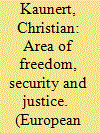

|
|
|
|
|
| Publication |
2005.
|
| Summary/Abstract |
Despite the significant growth the Area of Freedom, Justice and Security (AFSJ) has seen recently, it is still comparatively under-researched. The main argument of the article is that norms have been constructed over recent years in such a way that the AFSJ has set a project in motion which aims to create a veritable 'European Public Order'. This change has not come overnight though, and it has been normatively constructed over the past decade. In agreement with Christiansen, it is argued that a constructivist institutionalist approach may be best suited to analyse these developments, representing one of the new 'high points' of European construction. Four different stages of development are examined, i.e. the pre- and post-Maastricht, the Amsterdam and Tampere, and the Constitutional Treaty phases. These developments have now significantly altered the norm of national sovereignty in EU internal security. As a consequence of this, some of the most spectacular changes in the EU can be expected in this area in the future with the new five-year ASFJ programme agreed in The Hague.
|
|
|
|
|
|
|
|
|
|
|
|
|
|
|
|
| 2 |
ID:
101138
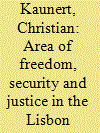

|
|
|
|
|
| Publication |
2010.
|
| Summary/Abstract |
Scholars may rightly claim the European Union's (EU) area of freedom, security and justice (AFSJ) has become one of the most significant developments in the European integration process. The Lisbon Treaty (LT) has the potential to push the AFSJ towards tremendous growth, and has provided the policy area with instruments that were unthinkable after the third pillar was created during the Maastricht Treaty negotiations. This article investigates the role of the European Commission in the process of constructing an 'AFSJ'. It argues that the Commission (through alliances with other institutional actors) managed to incrementally contribute to this shift in political norms. This shift derived from the policy-making level from 1999 onwards. It manifested itself specifically during the negotiations of the Constitutional Treaty (CT) and the subsequent re-negotiation of the LT. Here, the Commission acted with the support and the use of other supranational actors during the Convention, without which this result would have been difficult, if not impossible, to obtain. Firstly, the article will deal with the main advances of the CT which resulted in the LT. Subsequently, the role of the Commission and other EU institutional actors will be examined, resulting in an overall evaluation.
|
|
|
|
|
|
|
|
|
|
|
|
|
|
|
|
| 3 |
ID:
116199
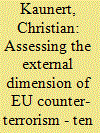

|
|
|
|
|
| Publication |
2012.
|
| Summary/Abstract |
This special issue has investigated the external dimension of European Union's (EU) counter-terrorism in much more detail than ever before. EU's counter-terrorism policy has been criticized on various grounds, ranging from questioning its efficiency, to coherence and implementation. On the one hand, the EU is characterized as a 'paper tiger', while, on the other hand, scholars point out that the EU has taken great strides toward increasing integration and encouraging cooperation between member states since 9/11. This underlines the complexity of the security environment, shaped by the threat of terrorism, in which the EU functions. Despite those efforts to provide a direction and achieve more concerted European action in the field of security, there are still many unanswered questions. Following the 11 March 2004 attacks on Madrid, which killed almost 200 people, the EU underlined the importance of deepening the international consensus to combat terrorism, which made it an increasing actor in global counter-terrorism efforts. The excellent articles in this special issue are testimony to the importance of analysing these developments.
|
|
|
|
|
|
|
|
|
|
|
|
|
|
|
|
| 4 |
ID:
116684
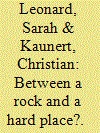

|
|
|
|
|
| Publication |
2012.
|
| Summary/Abstract |
This article focuses on the financial sanctions adopted by the European Union (EU) against individuals suspected of involvement in terrorist activities. This sanctions regime has been sharply criticised for its negative impact on human rights and has seen several judicial challenges before the European Courts. In contrast with most of the existing literature, which focuses on legal issues or examines the consequences of the EU financial sanctions, this article takes a step back to examine the reasons for which the EU decided to adopt these controversial financial sanctions in the first place. This article argues that it is mainly its commitment to 'UN-centred effective multilateralism' that has led the EU to adopt these financial sanctions measures in order to align itself with the UN financial sanctions regime. However, the Kadi landmark ruling of the European Court of Justice (ECJ) has challenged the pre-eminence of multilateralism over other considerations, such as the respect for human rights. As the Court of Justice prepares to hand down its second judgment in this case, the EU is left torn between its commitment to multilateralism and its commitment to human rights, which can be fully reconciled only if the UN sanctions regime meets the EU's human rights standards.
|
|
|
|
|
|
|
|
|
|
|
|
|
|
|
|
| 5 |
ID:
136863
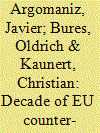

|
|
|
|
|
| Summary/Abstract |
The Treaty on the European Union (EU) stipulates that one of the key objectives of the Union is to provide citizens with a high level of safety within an Area of Freedom, Security and Justice (AFSJ). Given that the fight against terrorism is a prominent aspect of this general objective, it is remarkable that, in spite of its political relevance and decade-long history, it has only relatively recently received due attention in the academic community.1 At the time of writing, only a handful of post-9/11 edited volumes and special issues have focused on specific aspects of the EU counterterrorism efforts2 and initial monographs on the subject have only been relatively recently published by the three editors behind this special issue: Argomaniz3 has produced a theoretically informed assessment of the coherence of the EU response, Bures4 has examined the extent to which the EU can offer an added value in the fight against terrorism in Europe and Kaunert5 has studied how counter-terrorism has been a driver in the process of construction of the EU's AFSJ.
|
|
|
|
|
|
|
|
|
|
|
|
|
|
|
|
| 6 |
ID:
189106
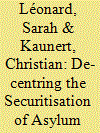

|
|
|
|
|
| Summary/Abstract |
This article contributes to the debates on de-centring the analysis of migration governance in Europe by focusing on the potential role of external actors in the securitisation of asylum and migration in the European Union (EU). Although there has been a growing amount of literature on the securitisation of asylum and migration in the EU, the role possibly played by external actors in this securitisation process has not been considered to date. This article addresses this gap using the case of Turkey. Theoretically, it contributes to the development of the securitisation framework by de-centring the study of securitisation processes. It argues that, from the vantage point of an external actor, a securitisation process highlights the existence of a vulnerability to a specific phenomenon that is perceived to be threatening. An external actor can then decide to exploit this vulnerability for its own gain, notably by making threats that play on the fears of the other political actor. Empirically, the article demonstrates how the Turkish government has been able to exploit the vulnerability of European countries to migration flows, which had been highlighted by the social construction of asylum and migration as security issues. By repeatedly threatening to send more asylum-seekers and migrants Europe’s way, the Turkish authorities have managed to secure some significant financial and political benefits for themselves in the last few years.
|
|
|
|
|
|
|
|
|
|
|
|
|
|
|
|
| 7 |
ID:
183899
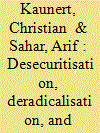

|
|
|
|
|
| Summary/Abstract |
This article assesses the processes and trends of desecuritisation through the deradicalisation of identity politics within the higher education sector in Afghanistan. It examines the desecuritisation of radicalisation through efforts directed at deradicalisation in the context of a securitised conflict environment. The article draws on the data generated through interviews and discussions with actors engaged with higher education. Higher education, while manipulated by numerous actors for ideo-political purposes, can function as a ‘desecuritisation’ and ‘deradicalisation’ mechanism by supplementing the statebuilding efforts, and more subtly, by providing a venue for critical teaching and learning processes. This article highlights that while the sector is typically a very low reconstruction priority, if addressed strategically, it has the potential to contribute to the desecuritisation of ethnic politics through the deradicalisation of ethnic grievances and hence function as a catalyst for effective and sustainable postwar recovery.
|
|
|
|
|
|
|
|
|
|
|
|
|
|
|
|
| 8 |
ID:
103195
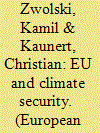

|
|
|
|
|
| Publication |
2011.
|
| Summary/Abstract |
This article analyses the development of the European Union (EU) as a global actor in the area of climate security. Building on this, it explicitly draws on constructivist concepts such as norm entrepreneurship and epistemic communities. To this end, it adopts the framework of epistemic communities, as developed by Peter Haas, in order to suggest that there is a group of EU officials, EU member states and think-tank activists, who drive the climate security agenda of the EU. Thus, it examines the precise actors involved in this EU epistemic community for climate security. This group promotes a reason for action at the global level, resulting in the attempt to diffuse this norm: climate change has consequences for international security; thus, it requires the development of appropriate policies and capabilities within the EU and globally. This article suggests that the epistemic community on climate security has been effective at diffusing this norm at both levels, albeit with differences.
|
|
|
|
|
|
|
|
|
|
|
|
|
|
|
|
| 9 |
ID:
134278
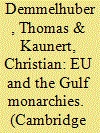

|
|
|
|
|
| Summary/Abstract |
The Persian Gulf region is of strategic importance to the European Union (EU). Yet, different political realities of authoritarian government in the Gulf challenge crucial parts of EU foreign policy that are based on normative power Europe concepts. Cooperation with the ruling dynasties appears beneficial for EU decision-makers if one looks at the comprehensive agenda of common interests in the Gulf region. In 2004, the EU aimed to build a strategic partnership with the Mediterranean and the Middle East; in this the EU emphasized its commitment to advancing its partnership with the Gulf countries. Yet, from the perspective of 2012 the results are bleak. Despite some signs of improvement in deepening the political, economic and security interactions with the region, there is still no concerted EU policy in the Gulf beyond the thriving bilateral activities of some EU member states. The events of the Arab Spring have increased the challenges even further. The EU, on the one hand, is trying to support forces of liberal and democratic reform in some neighbouring countries. On the other hand, it seeks close partnerships with authoritarian family dynasties in those Gulf countries in which a democratic opening is not around the corner. This article suggests an alternative explanation for this dichotomy. While there is an inherent tension between the EU's reformist agenda and its own interests, whether security or trade interests, this article argues that much of the EU's relationship with the Gulf countries can be explained through a misperception of the specific settings of government in the region. Despite a substantial agenda of interests on both sides in areas such as trade, energy, regional security, terrorism and irregular migration, the EU's foreign policy outputs remain rather limited.
|
|
|
|
|
|
|
|
|
|
|
|
|
|
|
|
| 10 |
ID:
103801
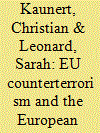

|
|
|
|
|
| Publication |
2011.
|
| Summary/Abstract |
Terrorists trained on European soil, but originating from the Middle East, attacked the world's only superpower on September 11, 2001. Countering this terrorist threat has become an increasingly significant part of European Foreign Policy. At the same time, the European Neighbourhood Policy (ENP) has become an increasingly important dimension of European Foreign Policy. This article examines the extent to which counterterrorism has occupied a prominent place in the ENP, with a particular focus on the Southern Mediterranean ENP partners. The findings of this article suggest that, despite the commonly held view in the literature that security issues, in particular terrorism, have dominated the ENP agenda, counterterrorism cooperation between the European Union (EU) and its Southern Mediterranean ENP partners has not advanced as much as might have been expected.
|
|
|
|
|
|
|
|
|
|
|
|
|
|
|
|
| 11 |
ID:
136870


|
|
|
|
|
| Summary/Abstract |
The Lisbon Treaty, which entered into force in 2009, considerably reinforced the powers of the European Parliament. This article examines to what extent the European Parliament has become an important actor in EU counter-terrorism by focusing on the external dimension of this policy. It also analyses the impact that this potentially changing role has had on the external dimension of EU counter-terrorism. This article puts forward two inter-related claims. Firstly, the role of the European Parliament in the external dimension of EU counter-terrorism has significantly grown in recent years. Following the entry into force of the Lisbon Treaty in December 2009, the European Parliament has become a fully-fledged actor in the external dimension of EU counter-terrorism. Secondly, the reinforcement of the role of the European Parliament has also led to a strengthening of both accountability and oversight in the external dimension of EU counter-terrorism, although there are still some limitations in that respect.
|
|
|
|
|
|
|
|
|
|
|
|
|
|
|
|
| 12 |
ID:
097170
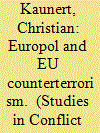

|
|
|
|
|
| Publication |
2010.
|
| Summary/Abstract |
This article offers an analysis of Europol's security actorness in the external dimension of EU counterterrorism. While Europol has attracted some scholarly attention, not so much work has focused on the meaning of its international agreements in counterterrorism. This article aims to investigate the international actorness of Europol at the international level in relation to the fight against international terrorism. It offers original conceptual insights based on empirical case studies of international agreements: Europol agreements with U.S. law enforcement, as well as Europol agreements with countries in the European Neighbourhood policy.
|
|
|
|
|
|
|
|
|
|
|
|
|
|
|
|
| 13 |
ID:
094864
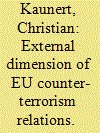

|
|
|
|
|
| Publication |
2010.
|
| Summary/Abstract |
Some very significant policy developments indicate "supranationalisation processes" of EU external relations in counter-terrorism, even in its most significant relationship with the USA. This means that, increasingly, the USA is willing to work with Europe through its institutionalised forum-the European Union. Thus, the EU achieves certain recognition on the world stage in areas previously completely unsuspected-the "high politics" of counter-terrorism. This supranationalisation process proceeds in two stages. Firstly, the construction of an Area of Freedom, Security and Justice (AFSJ) pools a significant amount of national sovereignty at the level of the EU through the establishment of internal EU competences. As a side effect, however, it also constructs an institutionalised structure for external actors, such as the U.S., to deal with. Through dealing within this institutional setting, member states' interests become defined in such a way that increasingly they construct a "European" interest related to counter-terrorism.
|
|
|
|
|
|
|
|
|
|
|
|
|
|
|
|
| 14 |
ID:
131635


|
|
|
|
|
| Publication |
2014.
|
| Summary/Abstract |
This article examines how the governance of justice and internal security in Scotland could be affected by the outcome of the Scottish independence referendum in September 2014. The article argues that it is currently impossible to equate a specific result in the referendum with a given outcome for the governance of justice and internal security in Scotland. This is because of the complexities of the current arrangements in that policy area and the existence of several changes that presently affect them and are outside the control of the government and of the people of Scotland. This article also identifies an important paradox. In the policy domain of justice and internal security, a 'no' vote could, in a specific set of circumstances, actually lead to more changes than a victory of the 'yes' camp.
|
|
|
|
|
|
|
|
|
|
|
|
|
|
|
|
| 15 |
ID:
134273
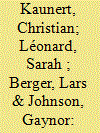

|
|
|
|
|
| Summary/Abstract |
Does the Arab Spring provide a new opening for Western cooperation with the Middle East? The Arab Spring involved a revolutionary wave of demonstrations and protests in the Arab world, starting on 18 December 2010, which forced rulers, at least partially, from power in Tunisia, Egypt, Libya and Yemen. Egypt, however, has since seen a reactionary movement re-establishing military power to the pre-revolutionary state. Additional uprisings occurred also in Bahrain and Syria, the latter escalating into full-scale civil war. A number of other countries have also seen serious protests, ranging from Algeria, Iraq, Jordan and Kuwait to Morocco. It is particularly noteworthy that the fallout from the war in Libya has had side effects for a simmering rebellion in Mali, where it appears that al-Qaeda is establishing itself in the north of the country. The European Union (EU) has been concerned about such an eventuality in the Sahel for some time. While some observers have drawn comparisons between the Arab Spring and the revolutions of 1989 in Eastern Europe, the precise endpoint and the direction of the Arab Spring revolutions remain to be identified. In short, the Arab world currently faces a period of social protest and change, which challenges our understanding of politics in the region and established assumptions about Western foreign policy towards this region.
|
|
|
|
|
|
|
|
|
|
|
|
|
|
|
|
| 16 |
ID:
129577
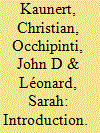

|
|
|
|
|
| Publication |
2014.
|
| Summary/Abstract |
Following several months of uncertainty in the wake of the rejection of the treaty establishing a constitution for Europe, the Lisbon Treaty eventually entered into force in December 2009. Although it fell short of establishing a constitution for the European Union (EU), it introduced several noteworthy changes, notably for EU internal security policies, also known as the 'Area of Freedom, Security and Justice' (AFSJ). This special section considers how various dimensions of the AFSJ have been affected by the Lisbon Treaty and the gradual reinforcement of supranational governance that it has generated in this key policy area. Over the past decade, the AFSJ has experienced tremendous development, making it one of the most dynamics areas of European integration. The AFSJ is a broad and heterogeneous policy domain, which includes asylum, immigration and border policies, counter-terrorism, justice and police cooperation, as well as the external dimension of these activities. Given the crucial importance of current internal security threats, such as terrorism, and the sensitivities surrounding policy responses to them, it is necessary to take stock of how far the EU has progressed toward its goals of an AFSJ and how this has been influenced by the most recent treaty changes. To accomplish this goal, this special section brings together some of the most distinguished scholars in the field and several younger scholars conducting cutting-edge research on the AFSJ.
|
|
|
|
|
|
|
|
|
|
|
|
|
|
|
|
| 17 |
ID:
101143
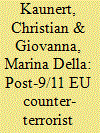

|
|
|
|
|
| Publication |
2010.
|
| Summary/Abstract |
The European Union counter-terrorist financing (EU-CTF) regime has experienced significant developments since 2001. This article builds on the notion of supranational policy entrepreneurship (SPE) in order to investigate the post-9/11 development of EU-CTF regime. Admittedly, counter-terrorism is a policy area in which supranational institutions have rarely taken the lead, nor consistently been very active. However, the article suggests that, despite the centrality that member states maintain in the policy-making process, European institutions, notably the European Commission and the Council Secretariat, have been significant in EU-CTF cooperation. While the European Commission and the Council Secretariat both played the role of an SPE, the article outlines the different ways in which this occurred. Empirically, the article challenges an intergovernmentalist perspective by examining the implementation of United Nations Security Council resolutions and Financial Action Task Force recommendations on countering terrorist financing at the EU level.
|
|
|
|
|
|
|
|
|
|
|
|
|
|
|
|
| 18 |
ID:
116194


|
|
|
|
|
| Publication |
2012.
|
| Summary/Abstract |
The construction of the Area of Freedom, Security and Justice has seen the pooling of a significant amount of national sovereignty at the European Union (EU) level through the establishment of internal EU competences. This process has also had the important side-effect of an increasing development of an EU interest in various areas of security, including in counter-terrorism. This article examines the processes through which the EU interest in counter-terrorism is constructed. It argues that, in line with social constructivist literature, it is important to conceptualise interests as being mutually constituted through interactions amongst political actors. It further develops two arguments in this respect. First, the United States (US) has exercised significant influence on the shaping of the EU interest in counter-terrorism. This point is particularly well-illustrated by the Passenger Name Record case. The second argument put forward by this article is that the process through which the EU interest is shaped has become increasingly complex, in particular following the entry into force of the Lisbon Treaty, which reinforced the powers of the European Parliament. A particularly apt illustration of this argument is the case of the SWIFT (Society for Worldwide Interbank Financial Telecommunication) Agreement.
|
|
|
|
|
|
|
|
|
|
|
|
|
|
|
|
| 19 |
ID:
134279
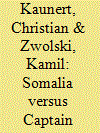

|
|
|
|
|
| Summary/Abstract |
An internal security problem of Somalia—state failure from internal conflict resulting in increased piracy—has increasingly become an external security problem for the European Union (EU). This article contributes to analysing the role of the EU as a security actor in countering piracy off the Horn of Africa, by examining three different dimensions of the EU response to this problem: (a) the immediate EU response (the EU military mission EUNAVFOR Atalanta); (b) the medium-term EU response (the Critical Maritime Routes (CMR) programme launched by the European Commission); and (c) the long-term EU response (development and security assistance). This article concludes that the EU has been very active in addressing piracy through its naval task-force to protect maritime transport in the western Indian Ocean and the Gulf of Aden, as well as its efforts to enhance regional counter-piracy capacities and thematic and geographical financial instruments. The EU thus has taken up the fight against ‘Captain Hook’.
|
|
|
|
|
|
|
|
|
|
|
|
|
|
|
|
|
|
|
|
|